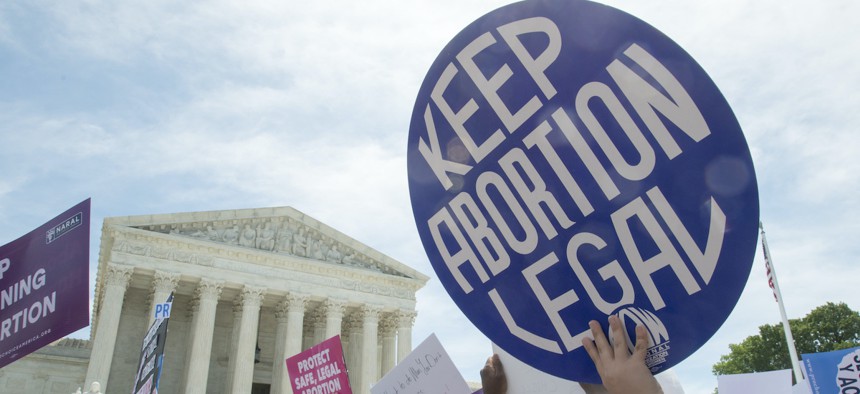Fearing the Future of Roe v. Wade, New Jersey Moves to Protect Abortion Access

Pro-choice supporters gather at the Supreme Court to protest the current move in some US States to ban legal abortion. May 21. 2019. Credit: Patsy Lynch/MediaPunch /IPX Associated Press
Gov. Phil Murphy said Friday that lawmakers would introduce a package of legislation to enshrine reproductive health care into state law.
Lawmakers in New Jersey will introduce legislation to protect and expand access to reproductive health care, including abortion, a move Gov. Phil Murphy said is necessary following the death of Supreme Court Justice Ruth Bader Ginsburg.
Ginsburg, a longtime member of the court’s liberal wing, was a staunch defender of abortion rights, including access to abortion. But exactly what will happen now to the landmark Roe V. Wade decision, which established the medical procedure as a constitutional right, is unclear following her death and President Donald Trump’s nomination of Judge Amy Coney Barrett to the court. Barrett has previously supported overturning Roe, although she has also acknowledged the decision as a legal precedent.
“As access to health care and the right to choose are under attack at the federal level, we will support, defend, and protect reproductive rights here in New Jersey,” Murphy said in a statement. “The Reproductive Freedom Act will remove barriers to reproductive health, as well as expand access to contraception while reaffirming choice.”
The Reproductive Freedom Act, supported by state Senate Majority Leader Loretta Weinberg and Assemblywoman Valerie Vainieri Huttle, would enshrine abortion into state law regardless of the status of Roe v. Wade. It would also require most private health insurers to cover abortion with no out-of-pocket costs and allow a broader range of health-care providers, including physicians’ assistants and certified midwives, to administer abortions.
New Jersey Right To LIfe, a pro-life organization, opposed the bill, saying in a statement it was an “extreme measure (that) is not supported by the majority of people in our state.”
Murphy, a Democrat, did not provide a timeline for the legislation. Democrats also control both the Senate and Assembly in New Jersey.
“The decision about whether and when to become a parent is one of the most important life decisions we make,” the governor’s office said in a statement. “We need to trust all people who can become pregnant to make decisions about their own health and lives.”
Governors in New York, Vermont and Illinois signed into law similar packages of legislation last year to ensure that reproductive health care, including abortion, remains accessible to residents even if federal law changes. But lawmakers in other states, including Georgia and Alabama, passed laws placing additional restrictions on abortions, including bans on the procedure during the first trimester. Some of those proposals have been deemed unconstitutional by federal judges, while others remain tied up in court.
Kate Elizabeth Queram is a staff correspondent for Route Fifty and is based in Washington, D.C.
NEXT STORY: In One State, Advocacy Groups Sue Over New Limit on the Number of Ballot Drop-Off Locations





